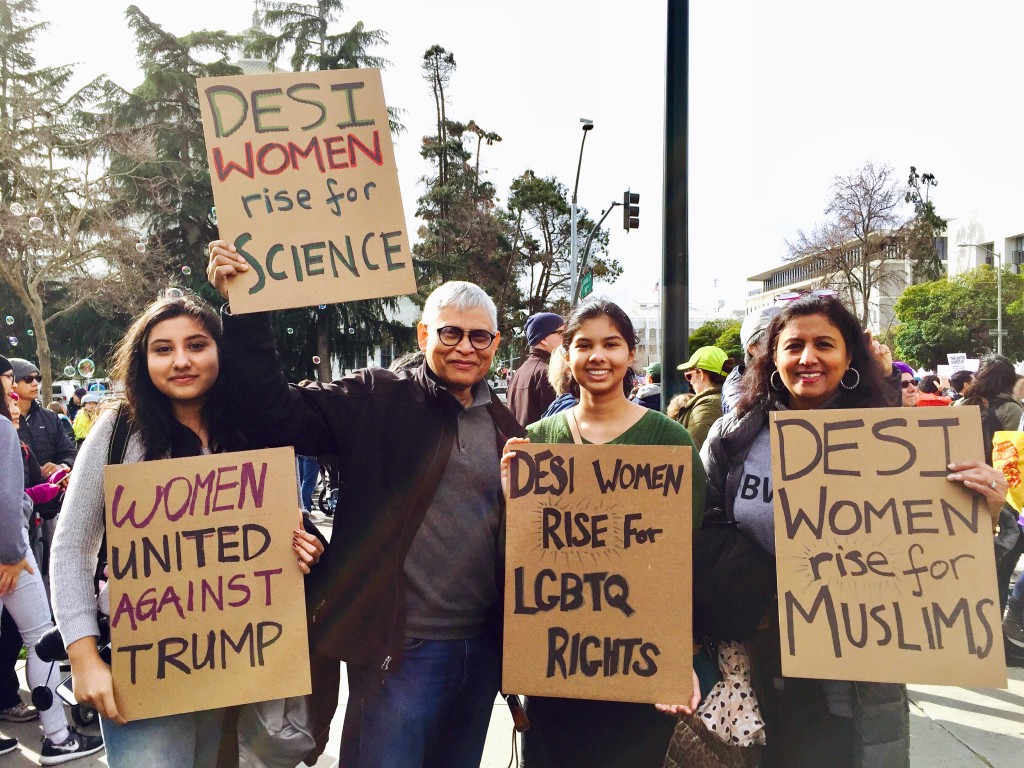
On January 21, over 2 million Americans crowded the streets of America to protest Donald Trump’s divisiveness and dangerous policies. South Asian women marched all over the country, including in Washington, D.C., Boston, and across the San Francisco Bay Area.
“As Desi women, this is our moment to rise. An attack on one of us is an attack on all of us.”
Trisha Chakrabarti marched in D.C., while her mother marched in California. “Trump has been targeting our communities for the past year,” she said. “He viciously attacked our auntie Ghazala Khan, mocked Indian call center workers, threatened to subject millions of Muslims to a national registry, and inspired a national surge of hate violence. As Desi women, this is our moment to rise. An attack on one of us is an attack on all of us.”
“South Asian women are pushing back — from Desi mothers and daughters protesting in the streets, to Pramila Jayapal in the halls of Congress.”
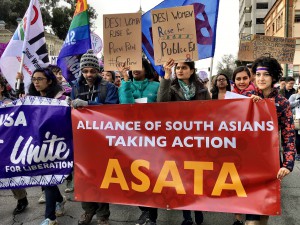
“Trump’s policies are dangerous,” said Sabiha Basrai from the Alliance of South Asians Taking Action (ASATA) in Oakland, CA. “In the last 24 hours, Trump recommitted to ending climate action, and targeting immigrants for deportation. These policies would reward polluters, tear apart families, and make kids sick. That’s why South Asian women are pushing back — from Desi mothers and daughters protesting in the streets, to Pramila Jayapal in the halls of Congress.”
“We marched for Purvi Patel.”
“We marched for Purvi Patel,” said Aliya Khan of NAPAWF, at the Women’s March in Washington, DC. “After she miscarried, Patel was sentenced to 20 years and imprisoned for over a year before being released last September. Her conviction occurred under a law signed by then-Indiana Governor Mike Pence. We judge politicians on their record, and Mike Pence has a track record of putting women from our community at risk.”
“Bangladeshi American women are standing up to Trump today. In the name of humanity, we refuse to accept a fascist America.”
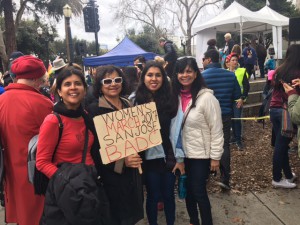
In San Jose, CA, Bangladeshi American Democratic Coalition members carried signs saying things like “Women’s Rights are Human Rights.” The President of BADC, Nasreen Rahim said, “Bangladeshi American women are standing up to Trump today. In the name of humanity, we refuse to accept a fascist America.”
“I never thought we’d see a self-acknowledged sexual abuser enter the White House and try to cut funding for fighting violence against women.”
“I don’t think of myself as a protester,” said Esha Bandyopadhyay Dash from San Francisco, CA. “But I never thought we’d see a self-acknowledged sexual abuser enter the White House and try to cut funding for fighting violence against women. Having just brought a little girl into this world last year, I cannot bear the thought of her growing up in fear for her safety. Trump’s policies and example put us all in danger — and I will not and cannot remain silent.”
“The women’s marches give me hope. We will stand with our allies, protect one another, and resist the forces that pit neighbor against neighbor”
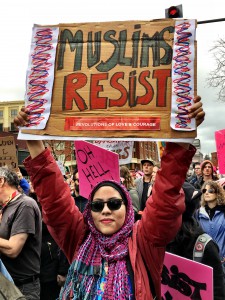
Alya Ali, one of the organizers of the San Francisco Women’s March, marched with other Muslim activists. “Since 9/11, Muslim, South Asian, Arab, and other minorities have faced tremendous backlash, from deadly hate crimes like the attack on the Oak Creek gurdwara, to the targeting of Muslims during Bush’s ‘special registration’ program. But the women’s marches give me hope. We will stand with our allies, protect one another, and resist the forces that pit neighbor against neighbor. This march is just the beginning of communities uniting.”
“Affordable healthcare is a right for everyone.”
On the streets of Boston, South Asian women marched holding signs defending health care access. “Affordable healthcare is a right for everyone,” said Sheetal Acharya, from the South Asian Coalition for the Boston Women’s March. “Repealing the ACA will have a significant negative impact on millions of individuals.”
“Our members are impacted by verbal attacks on immigrants, on women, on brown and LGBTQ people — and by the hate incidents they inspire.”
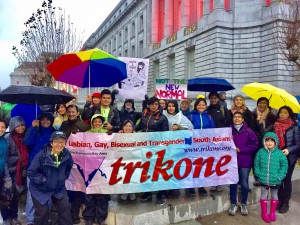
Members of Trikone, the oldest South Asian LGBTQ organization in the United States, showed up in full force in San Francisco. “We’re here to affirm dignity for all,” said Poonam Kapoor. “Our members are impacted by verbal attacks on immigrants, on women, on brown and LGBTQ people—and by the hate incidents they inspire. For many in our community, and particularly for transgender Desis, these attacks may be a matter of life and death.”
“We need an intersectional movement to win against Trump and the Republican Congress.”
Dalit American artist Thenmozhi Soundararajan marched in D.C. with Dalit and Muslim women. “Dalit movements are one of the oldest resistance movements in the world,” she said. “We’re ready to contribute our resilience to stand up to Trump’s attacks on women, transgender, Black, Muslim, and other targeted communities. Real solidarity means showing up, and carrying each other’s water. We need an intersectional movement to win against Trump and the Republican Congress.”
“This warrior is ready to fight for her rights, to defend her community, and to protect our earth.”
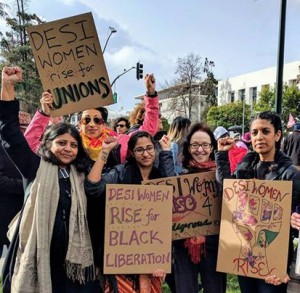
Nepali American blogger Richa Pokhrel had a clear message for Donald Trump. “I never thought a President would affect me this deeply. I’ve always been an obedient Nepali girl, one who follows the rules and doesn’t want to stir up any trouble. I want to thank you for bringing out the warrior that has been dormant for the last thirty years. This warrior is ready to fight for her rights, to defend her community, and to protect our earth. There are many of us, millions and millions, and we are organizing to safeguard all that we hold dear.”
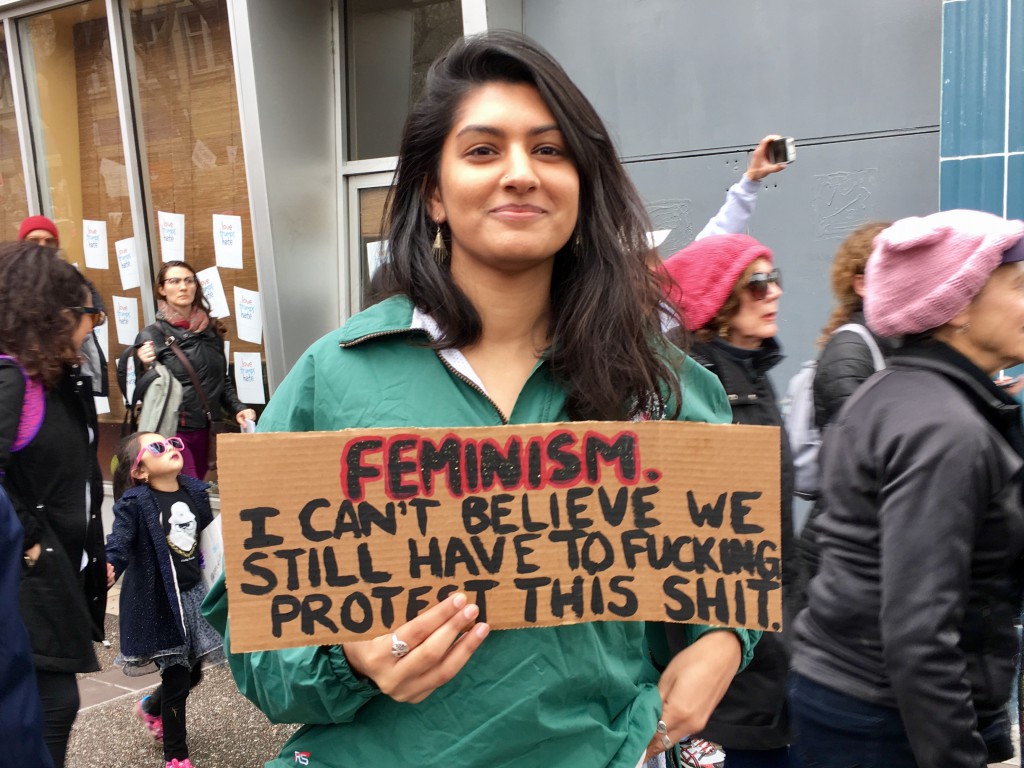
* * *
Anirvan Chatterjee is a technologist, storyteller, and activist from Berkeley, CA.












